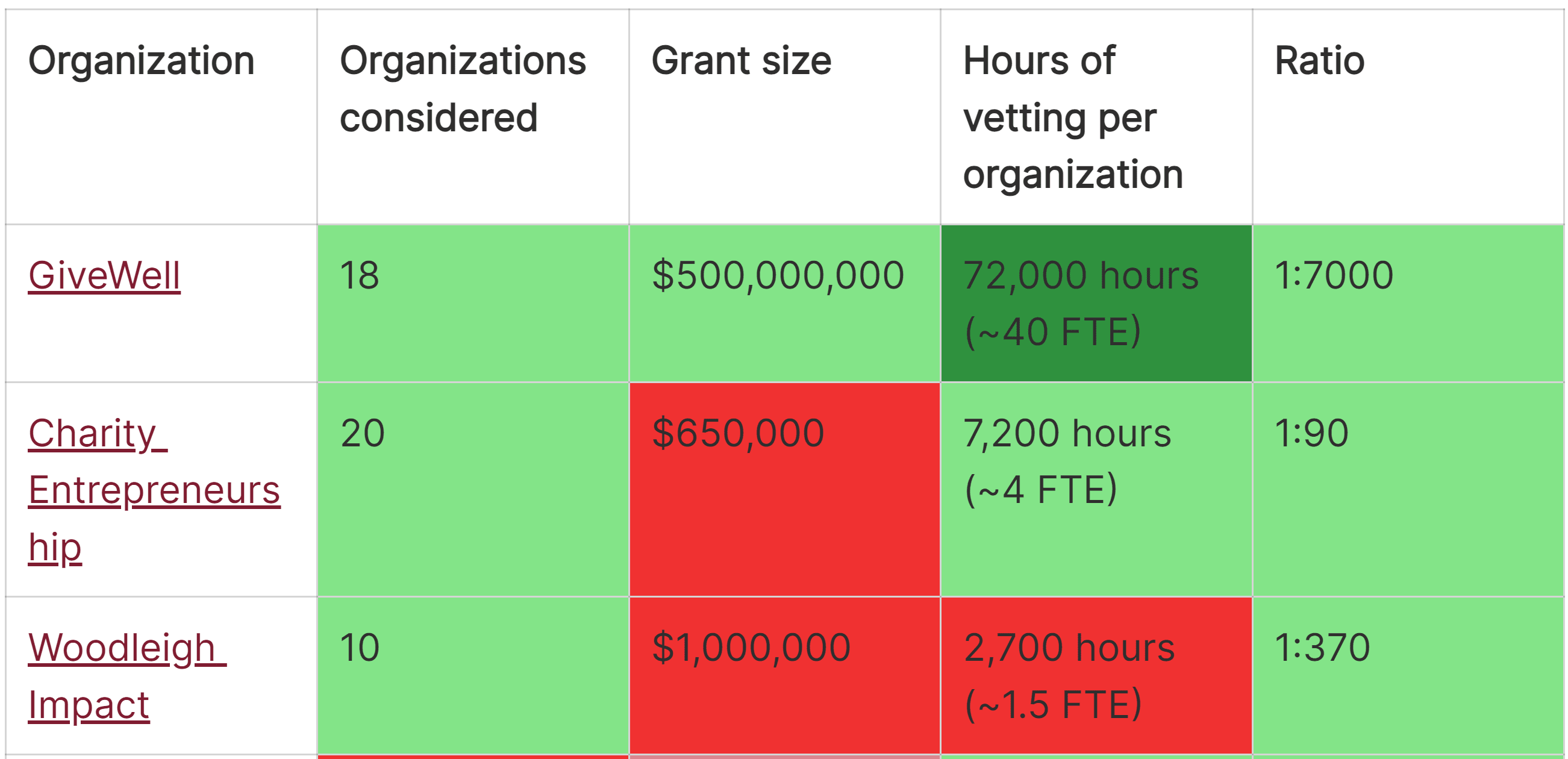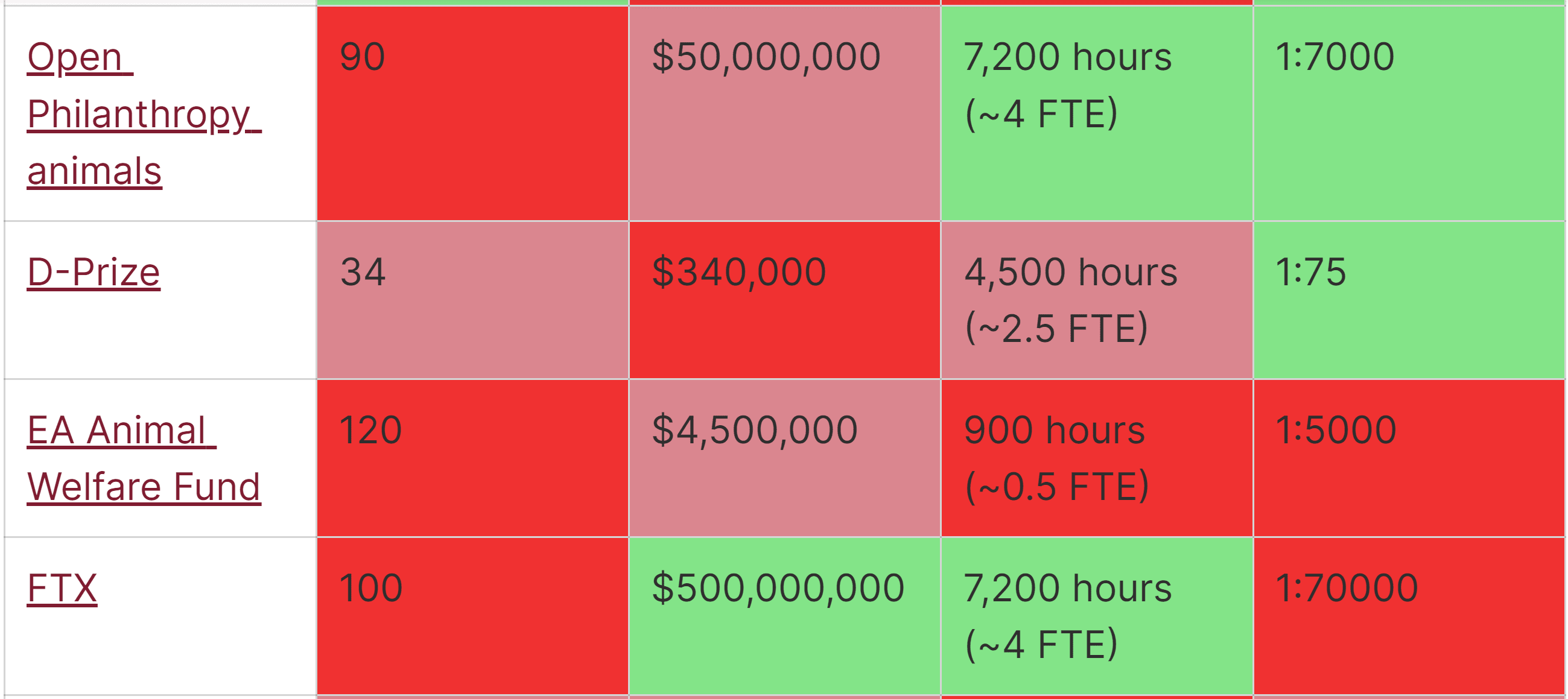On 17 February 2024, the mean length of the main text of the write-ups of Open Philanthropy’s largest grants in each of its 30 focus areas was only 2.50 paragraphs, whereas the mean amount was 14.2 M 2022-$[1]. For 23 of the 30 largest grants, it was just 1 paragraph. The calculations and information about the grants is in this Sheet.
Should the main text of the write-ups of Open Philanthropy’s large grants (e.g. at least 1 M$) be longer than 1 paragraph? I think greater reasoning transparency would be good, so I would like it if Open Philanthropy had longer write-ups.
In terms of other grantmakers aligned with effective altruism[2]:
- Charity Entrepreneurship (CE) produces an in-depth report for each organisation it incubates (see CE’s research).
- Effective Altruism Funds has write-ups of 1 sentence for the vast majority of the grants of its 4 funds.
- Founders Pledge has write-ups of 1 sentence for the vast majority of the grants of its 4 funds.
- Future of Life Institute’s grants have write-ups roughly as long as Open Philanthropy.
- Longview Philanthropy’s grants have write-ups roughly as long as Open Philanthropy.
- Manifund's grants have write-ups (comments) of a few paragraphs.
- Survival and Flourishing Fund has write-ups of a few words for the vast majority of its grants.
I encourage all of the above except for CE to have longer write-ups. I focussed on Open Philanthropy in this post given it accounts for the vast majority of the grants aligned with effective altruism.
Some context:
- Holden Karnofsky posted about how Open Philanthropy was thinking about openness and information sharing in 2016.
- There was a discussion in early 2023 about whether Open Philanthropy should share a ranking of grants it produced then.
- ^
Open Philanthropy has 17 broad focus areas, 9 under global health and wellbeing, 4 under global catastrophic risks (GCRs), and 4 under other areas. However, its grants are associated with 30 areas.
I define main text as that besides headings, and not including paragraphs of the type:
- “Grant investigator: [name]”.
- “This page was reviewed but not written by the grant investigator. [Organisation] staff also reviewed this page prior to publication”.
- “This follows our [dates with links to previous grants to the organisation] support, and falls within our focus area of [area]”.
- “The grant amount was updated in [date(s)]”.
- “See [organisation's] page on this grant for more details”.
- “This grant is part of our Regranting Challenge. See the Regranting Challenge website for more details on this grant”.
- “This is a discretionary grant”.
I count lists of bullets as 1 paragraph.
- ^
The grantmakers are ordered alphabetically.




Agreed. GiveWell has revised their estimates numerous times based on public feedback, including dropping entire programmes after evidence emerged that their initial reasons for funding were excessively optimistic, and is nevertheless generally well-regarded including outside EA. Most people understand its analysis will not be bug free.
OpenPhil's decision to fund Wytham Abbey, on the other hand, was hotly debated before they'd published even the paragraph summary. I don't think declining to make any metrics available except the price tag increased people's confidence in the decision making process, and participants in it appear to admit that with hindsight they would have been better off doing more research and/or more consideration of external opinion. If the intent is to shield leadership from criticism, it isn't working.
Obviously GiveWell exists to advise the public so sharing detail is their raison d'etre, whereas OpenPhil exists to advise Dustin Moskovitz and Cari Tuna, who will have access to all the detail they need to decide on a recommendation. But I think there are wider considerations to publicising more on the project and the rationale behind decisions even if OpenPhil doesn't expect to find corrections to its calculations useful
The non-reputational costs matter too and it'd be unreasonable to expect enormously time-consuming GiveWell and CE style analysis for every grant, especially with the grants already made and recipients sometimes not even considering additional funding sources. But there's a happy medium between elaborate reasoning/spreadsheets and a single paragraph. Even publishing sections from the original application (essentially zero additional work) would be an improvement in transparency.